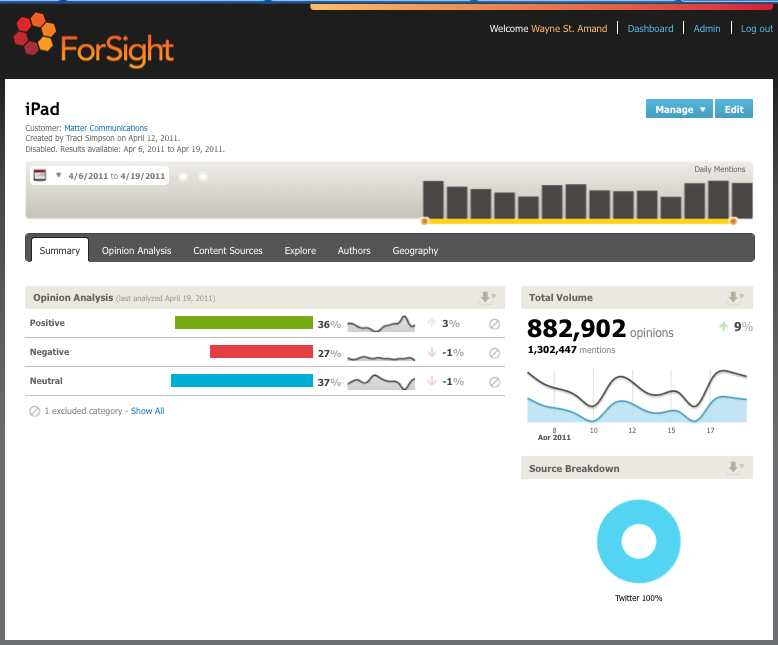Surprising Mindshare Statistics Around the Big Four Tablets [Infographic]
Which came first - analytics software, or the concept of memes, i.e. ideas transmitted through societies like a gene or virus? As with the chicken and the egg, i don't think the answer's obvious.
What is obvious is that mining readily-available social media data for predictive purposes has become a powerful tool for marketers and other business watchers.
Crimson Hexagon provides just such a tool called ForSight. The Cambridge, Mass. company, whose customers include AT&T, HP, Microsoft and (at one time) my employer, provided me some recent mindshare statistics around the four leading tablets on the market: the Samsung Galaxy Tab, Motorola Xoom, BlackBerry PlayBook and Apple's iPad (none of these vendors is currently a customer of Crimson Hexagon, according to Wayne St. Amand, marketing director at Crimson Hexagon).
Note: the statistics measure Tweets and retweets only. ForSight can analyze blogs, FaceBook, discussion forums and more, but those were excluded for this analysis.
Spam and robot-generated tweets were eliminated, he said, as well as off-topic tweets. The latter were determined by the ForSight software, which was "trained" by a human data analyst picking on and off-topic tweets.
Finally, a simple sentiment analysis is performed, to determine a) is this a mere mention or is there an opinion expressed? b) what is that opinion? ForSight can, but didn't, drill down to find the reason for the sentiment. That might explain at least one of the surprising findings below.
The statistics below differ slightly from the ones shown by BostInnovation yesterday because they are for a slightly larger date range (April 6 to April 19). That is also key, as we'll learn below.
For developers (wanting to know what platforms to support) and other tablet marketwatchers, read on! (And click on the charts to expand them for easier viewing, best saving)
Apple iPad (and iPad 2)
Release Date: April 2010 (and March 11, 2011 for iPad 2)
Sales to date: 19 million (March 2011)
Percentage of Opinions: 84.1%
Percentage of Total Mentions: 84.9%
Unsurprisingly, Apple garnered the lion's share of tweets. Its 84-85% share of tweets neatly parallels its actual market share.
What is a surprise, though, is the percentage of negative tweets. In absolute terms, that is almost 238,000 negative tweets related to the iPad in the last two weeks.
St Amand points out, however, that ForSight didn't drill down to examine whether the negative tweets were about the iPad 2 itself, or the much-publicized shipment delays. Based on tweets he saw, a "significant" percentage of tweets were probably from users complaining about delays in receiving their iPad, he said.
Samsung Galaxy Tab
Release date: Nov 2010
Sales to date: 3 million worldwide (late March 2011)
Percentage of Opinions: 2.2%
Percentage of Total Mentions: 2.6%
The Tab is an example of where its market share exceeds its apparent mindshare. But there are several explanations. First, the tablet was first released many months ago, while the Forsight analysis, as mentioned above, was only for the past two weeks. Chatter has obviously died down around the Tab (though a second 10-inch version is in the works now).
Second, much of Samsung's shipments have been to non-English-speaking markets in Asia. This analysis was for English-language tweets only. Third, Samsung has a whole line of devices, including smartphones and tablets, based around the Galaxy brand. Not realizing this, many twitterers may have sent out messages about the Samsung Galaxy but omitted the terms Tab or tablet. Those tweets were likely excluded, concedes St Amand.
The Tab had this going for it: the high ratio of positive:negative tweets (34%:14%).
Motorola Xoom
Release date: February 24, 2010
Sales to date: Reportedly 100,000 (early April, 6 weeks after launch)
Percentage of Opinions: 4.7%
Percentage of Total Mentions: 4.0%
Another Android tablet, the Xoom has so far disappointed sales-wise. That's despite running Google's latest tablet-only OS, Android 3.0 Honeycomb, and garnering decent reviews. Its mindshare is double that of the Tab, but the Xoom is only six weeks old at this point. So that can't be good. Another potentially bad sign: the Xoom has the highest percentage of negative tweets among the Big Four.
RIM BlackBerry PlayBook
Release Date: April 19, 2011
Sales to Date: Reportedly 45,000 on launch day
Percentage of Opinions: 9%
Percentage of Total Mentions: 8.6%
The PlayBook's mindshare was obviously buoyed by its release date. Will that translate into actual sales gains? St Amand was hesitant to say. "The amount of conversation around the iPad is through the roof," he said.
A good sign: despite the many negative reviews of the PlayBook that appeared last week during the heart of ForSight's analyzed time period, only 5% of tweets about the PlayBook were negative (17% were positive and 79% were neutral).
St Amand stood by ForSight's results. "The majority of the tweets we saw really was neutral," he said.
